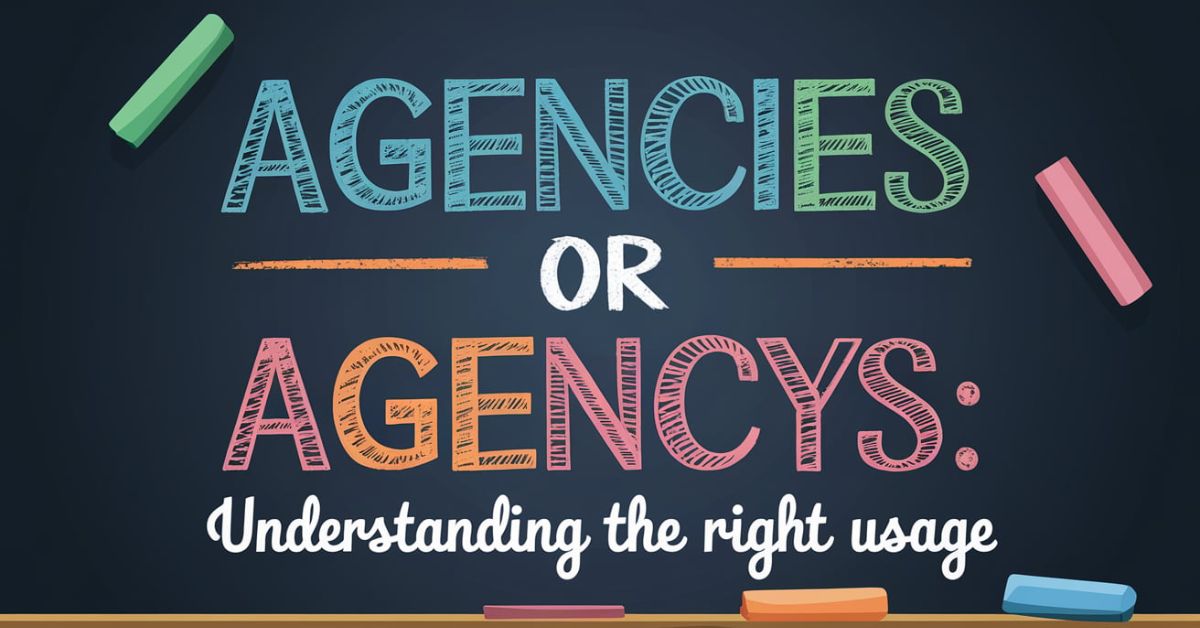The English language can be tricky, especially when it comes to plural vs. possessive forms. One of the most common grammar mistakes people make is confusing “agencies” with “agencys.” If you’ve ever wondered which one is correct and why, you’re not alone.
Clarity in communication is essential in both professional communication and casual writing. Using incorrect forms can affect your credibility, especially in business writing and workplace writing.
The short answer? “Agencies” is correct, while “agencys” is a mistake. But why is this the case? Let’s break it down, explore grammar rules, and understand the impact of proper spelling in business writing and beyond.
Quick Summary
The word “agency” follows a specific grammar rule when forming its plural. In English, nouns ending in “y” preceded by a consonant change “y” to “i” and add “es” in plural form. That’s why “agency” becomes “agencies” and not “agencys.”
This follows the same pattern as “policy” (policies), “company” (companies), and “emergency” (emergencies). If you’ve been using “agencys,” it’s time to correct it to maintain professionalism and ensure writing clarity.
Understanding these grammar distinctions helps in various settings, from email etiquette to industry analysis. Whether you’re drafting a report, writing an email, or posting on social media, small errors like this can impact how others perceive your expertise.
Understanding Agencies or Agencys
Many people get confused because of how English treats possessive nouns differently from plural ones. Agencies is simply the plural form of “agency,” meaning more than one agency. On the other hand, “agencys” is incorrect because English does not form plurals by simply adding “s” when the noun ends in “-y.” Instead, the correct spelling is “agencies.”
It’s important to get this right in professional communication because using the wrong form can make writing look unpolished. In the business world, clients and colleagues expect writing clarity, and small mistakes can reduce credibility. In official workplace writing, such errors can be distracting and misleading.
Agencies: Definition and Usage
The correct plural of “agency” is agencies, which refers to multiple organizations that provide specific services. The term is widely used in business, government, and marketing sectors.
For example, advertising agencies create marketing campaigns, while government agencies regulate laws and policies. In the context of industry analysis, various agencies oversee sectors like finance, healthcare, and consumer protection.
5 Synonyms for Agencies:
- Organizations – Large bodies that manage specific tasks.
- Firms – Often used for companies in legal, financial, or consulting services.
- Institutions – Groups established for public or private services, such as education.
- Bureaus – Often used in government, such as the FBI (Federal Bureau of Investigation).
- Departments – Specific sections within larger organizations handling certain functions.
In everyday conversation, you might say: “Several agencies are responsible for public safety.” This use of “agencies” makes it clear that you’re referring to more than one agency.
Agencys: Definition and Usage
There’s no real grammar rule that allows “agencys” to be correct. Some people mistakenly use “agencys” when trying to form a plural, but this is incorrect. English does not create plurals by simply adding “s” to words ending in “y” when a consonant comes before the “y.”
Some may confuse “agencys” with the possessive form, but that would also be incorrect. The correct possessive of “agency” is “agency’s” for singular possession and “agencies’” for plural possession.
5 Synonyms for Agencys (Correcting the Mistake)
- Branches – Different divisions of an organization.
- Divisions – Sections within a company or government.
- Companies – General term for businesses.
- Entities – Formal way to refer to organizations.
- Offices – Specific locations handling agency operations.
Side-by-Side Comparison
| Term | Correct or Incorrect? | Meaning & Usage |
| Agencies | ✅ Correct | Plural of “agency,” used for multiple organizations. |
| Agencys | ❌ Incorrect | A common mistake; should be “agencies.” |
| Agency’s | ✅ Correct | Possessive form of one agency. |
| Agencies’ | ✅ Correct | Possessive form of multiple agencies. |
Everyday Usage Examples
Agencies in Sentences
Many agencies specialize in digital marketing to help businesses grow online. Government agencies enforce regulations to maintain industry standards. Several advertising agencies are launching new campaigns this season.
Agencys in Sentences (Incorrect Usage)
The real estate agencys are offering great deals this month. ❌ Marketing agencys help brands build strong identities. ❌
FAQs: Agencies or Agencys
Q: Is “agencys” ever correct?
A: No, “agencys” is always incorrect. The proper plural form is “agencies.”
Q: Why does “agency” change to “agencies”?
A: In English, nouns ending in “y” preceded by a consonant change “y” to “i” and add “es.”
Q: What’s the difference between “agencies” and “agency’s”?
A: “Agencies” is the plural form, while “agency’s” is the possessive form of a single agency.
Q: How do I remember the correct spelling?
A: Think of words like “policy → policies” and “company → companies.” The same rule applies.
Grammar Rules and Examples
English follows a simple rule when forming plurals of nouns ending in “y.”
- If a noun ends in “y” after a consonant, replace “y” with “ies”:
- Agency → Agencies
- Policy → Policies
- Emergency → Emergencies
- If a noun ends in “y” after a vowel, just add “s”:
- Toy → Toys
- Day → Days
- Key → Keys
Conclusion
Getting the difference between “agencies” and “agencys” right is more than just following grammar rules; it’s about maintaining writing clarity and ensuring professionalism. Whether you’re writing an email, preparing a report, or conducting industry analysis, small mistakes can impact how people perceive your work. Possessive nouns and plural vs. possessive distinctions are key to mastering English grammar. Keep practicing, and soon, choosing the right form will be second nature!
Read More: Targetted or Targeted: What’s The Difference?
See More Results: Infront or In Front: What’s The Difference?
Learn About: Moment Vs Momment: What’s The Difference?

